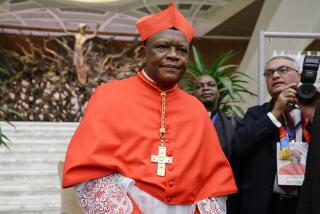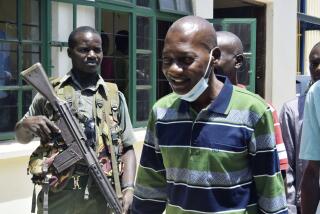Pastors in South Africa face criticism for unorthodox methods — like spraying worshipers with pesticide
The woman’s body was rigid from tension as Lethebo Rabalago sprayed a can of a powerful insecticide called Doom in her face.
Rabalago, who calls himself a “prophet detective,” posted pictures of the incident Sunday and said the tactic would miraculously heal the woman’s ulcer.
Dubbed the Prophet of Doom on social media, Rabalago draws in dozens of congregants and donations to his church, Mount Zion General Assembly, in South Africa’s Limpopo province.
He is not the only pastor to use unorthodox methods. Others include Penuel Mnguni, known as the Snake Pastor, whose congregants in the province of Mpumalanga have eaten live snakes and rats to try to heal illnesses, and Lesego Daniel, who calls himself Storm Rider, whose congregants in Pretoria have consumed gasoline to address illnesses.
Many of the thousands of churches in South Africa are small informal houses of worship run by pastors who engineer what they or their believers refer to as miracles — healing illnesses, finding jobs or exorcising demons, authorities say.
No one knows exactly how many of these churches exist because there is no South African government requirement to register such places, said Thoko Mkhwanazi-Xaluva, chairwoman of a statutory body, the Commission for the Promotion and Protection of the Rights of Cultural, Religious and Linguistic Communities, or CRL Rights Commission.
Services in the churches often start in the early morning and continue late into the night. Aside from taking tithes and offerings, some pastors sell DVDs of sermons, books, T-shirts, mugs, pens and other branded items, as well as “healing” oils or waters. Often, the cash goes straight into their personal accounts, according to a report by the CRL Rights Commission.
Rabalago, who uses a large tent as a church in the northern province of Limpopo, takes credit for miracles such as curing cancer and AIDS, ensuring a young man’s selection on the local soccer team, the prevention of a car accident, and the healing of wounds and illnesses via posts on Facebook and Twitter.
The woman identified on the church’s Facebook page as Mrs. Mitala, who was photograped while she was being sprayed with insecticide by Rabalago, was among several congregants who were sprayed.
The CRL Rights Commission expressed shock and repugnance at Rabalago’s use of a pesticide on congregants. Tiger Brands, the manufacturer of Doom, warned it was dangerous to spray the insecticide on people, and called on Rabalago to stop. Other South Africans posted angry comments on the church’s Facebook page condemning the use of the insectide.
Rabalago, 24, didn’t respond to The Times’ request for an interview but told local media God instructed him to use Doom to heal followers. People opened their eyes with no ill effects after being sprayed in the face, he said.
“God can do anything. God can use anything. God can use oil. God can use water. I just took the kind of things that I believe can relieve people. I haven’t healed anyone because I’m not a healer. How many people has God healed? Many. I can’t even count,” he said in a television interview.
He denied making money from so-called miracles, calling them a “gift of God.” He declined to answer whether people gave tithes or offerings to the church. Rabalago has not been charged with any criminal offense.
The CRL Rights Commission has no power to act against the pastor given the willingness of participants in his rituals, Mkhwanazi-Xaluva said in a phone interview.
However, the commission held public hearings this year on the commercialization of churches and exploitation of gullible congregants, and has issued a report to government officials. The commission’s report said profiteering by pastors was a concern.
“We heard of many examples where: People are expected to pay substantial amounts of money before blessings and prayers could be said over them; blessed water and oils are sold to congregants at a high marked-up price; access to the spiritual leader or traditional healer is only guaranteed by payment of a fixed amount of money; T-shirts, towels, and Vaseline are sold to congregants for good luck,” the report said. It added that followers were often asked to make bank card payments during ceremonies.
The report also expressed concern about pastors who created personality cults and subjected their congregants to rituals that raised questions of human rights and ethics.
The commission’s recommendations included that pastors should be licensed and a peer review body should be set up.
“We don’t know how many churches there are. The government doesn’t know. I can wake up and start up a church tomorrow. There’s no law that stops me from doing that,” Mkhwanazi-Xaluva said.
She said some pastors appeared to be competing against one another to use the most unorthodox methods, to gain attention and publicity, to attract followers.
“It’s a marketing tool for them to make them popular and get attention. It exploits people’s difficulties.”
She said poverty and inequality in South Africa led congregants to churches promising miracles or at least improvements.
“When people are desperate they become more pliable and more accepting of things that you would not normally accept,” Mkhwanazi-Xaluva said. “As inequality rises and people grow up and see the people they grew up with getting better and better and their lives are getting worse and worse, they seek divine intervention.
“If they don’t get that from traditional churches, they will go elsewhere,” she said. “These religious leaders, if you can call them that, they’re seeing a gap in the market.”
Twitter: @RobynDixon_LAT
More to Read
Start your day right
Sign up for Essential California for news, features and recommendations from the L.A. Times and beyond in your inbox six days a week.
You may occasionally receive promotional content from the Los Angeles Times.






